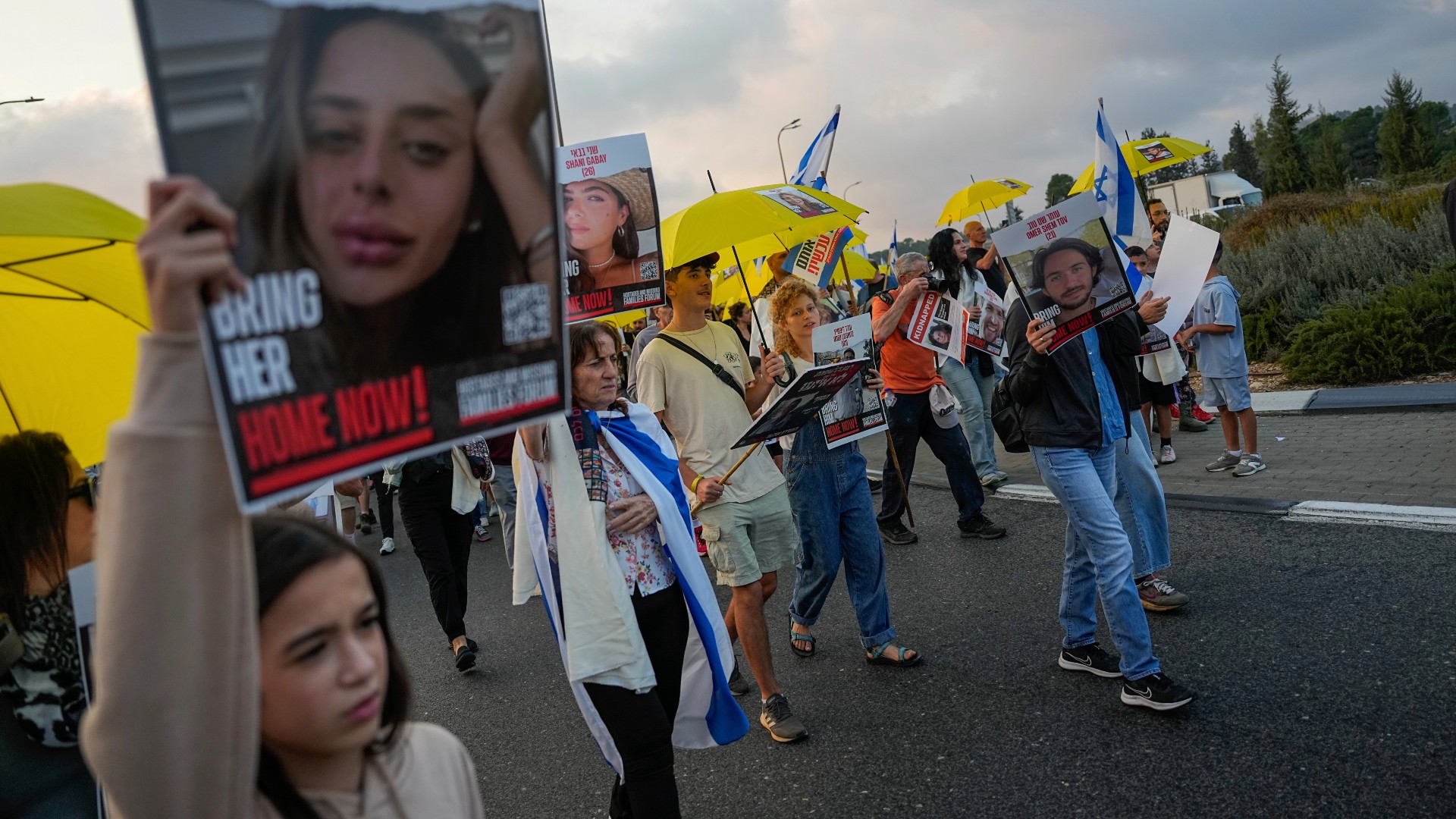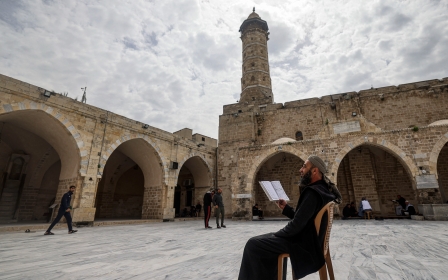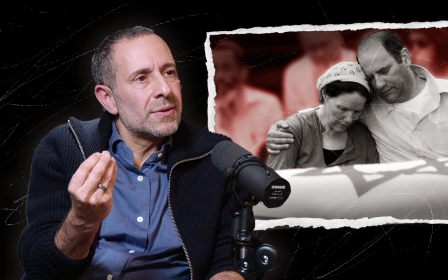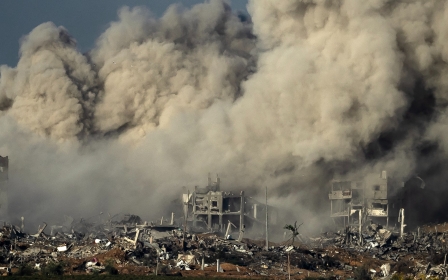Israel-Palestine war: The fate of Hamas’ captives could tear Israeli society apart
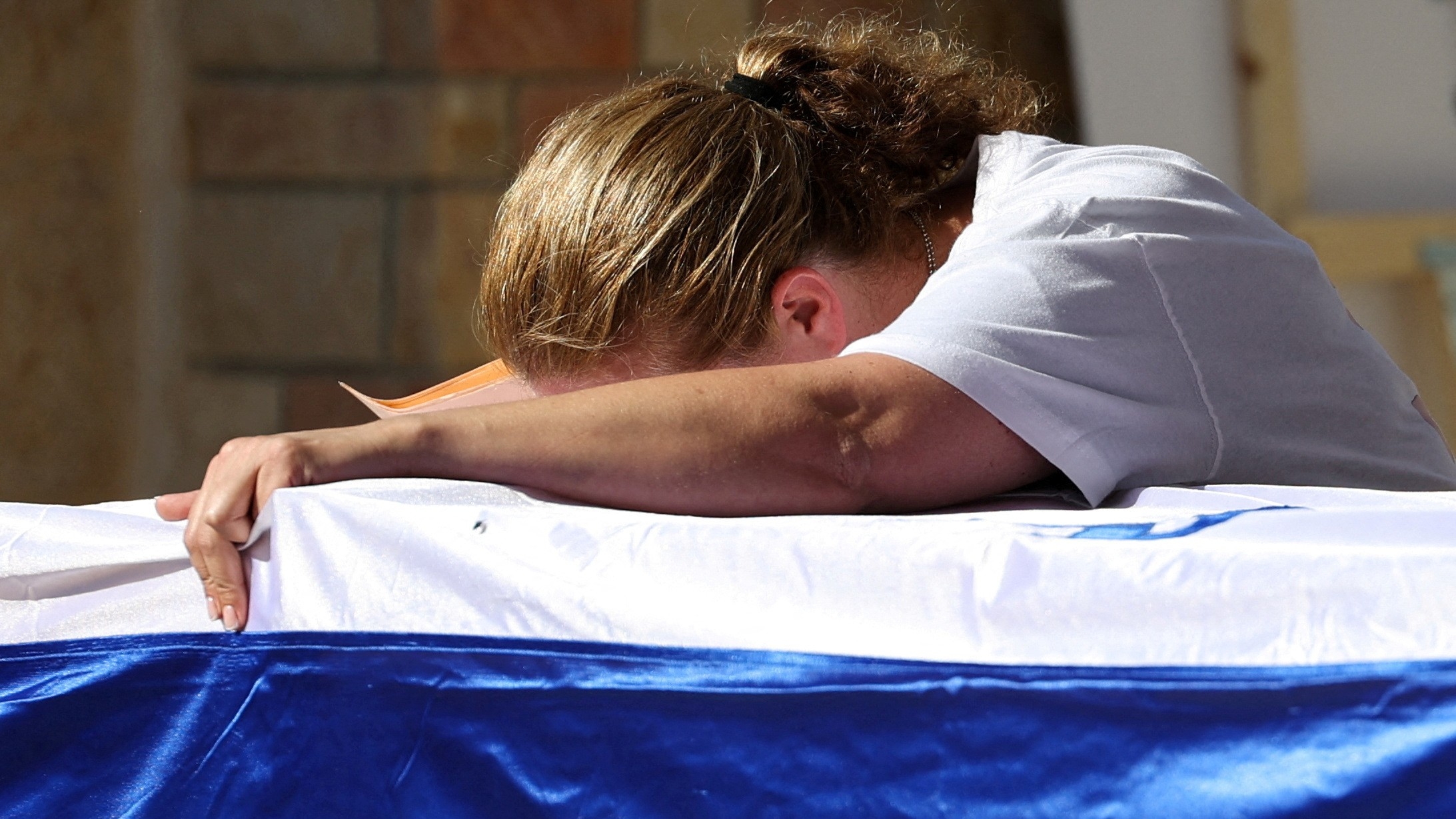
The captives held in the Gaza Strip are now the most sensitive issue in Israel.
It has been more than a month since around 240 people were taken captive by Palestinian fighters during the Hamas-led attack on Israeli communities near the Gaza Strip.
Yet no one really knows what is going on in the negotiations to free them. There have been various media reports, including by Middle East Eye, suggesting that swaps for Palestinian prisoners held by Israel have been close.
Hamas has been relatively open about the issue. It has suggested freeing a handful of civilian captives in exchange for a cessation of hostilities, followed by around 100 more in exchange for Palestinian women and minors being held in Israeli prisons.
Israel nonetheless ploughs on with its offensive in Gaza, which has now killed more than 12,000 Palestinians, including 5,000 children.
Stay informed with MEE's newsletters
Sign up to get the latest alerts, insights and analysis, starting with Turkey Unpacked
This week, the bodies of two Israeli captives were recovered by soldiers. One suffered from cancer and another was a soldier that Hamas said was killed in an Israeli raid, but it is not known for sure how they died.
The question for Israeli society today is: what kind of commitment does the state have to bring these hostages back alive?
This is an interesting development. In the past, there was an unspoken assumption that Israel would do all it could to free its citizens taken hostage.
We have not seen this many Israelis taken captive since the 1973 Middle East war, and many of those were troops whose aircraft were shot down in Syrian and Egyptian territory.
Today, the majority of Hamas’ captives are civilians. Only around 35 are believed to be soldiers. The situation is very different to anything seen in the past.
Follow Middle East Eye's live coverage for the latest on the Israel-Palestine war
Israel has previously paid a high price for releasing its soldiers. Most recently, 1,027 Palestinian prisoners were freed in 2011 in exchange for Gilad Shalit, an Israeli held by Hamas.
There has always been a sort of social contract in Israel: citizens give the military their sons and daughters for conscription, and in return the state will do everything it can to bring them home - even if killed in action.
Now this mood has changed. It has to do with the rise of the religious right-wing in Israeli society and also in the army itself. There are more medium- and high-ranking officers from the religious right in the military than ever before, and the government itself is dominated by far-right settlers.
This has led to a new kind of thinking, where Israelis should be expected to sacrifice themselves for their homeland and the state has no obligation to bring you back.
There is far from a consensus on this matter. But there are loud voices now saying that the cause of the Jewish state is so important that nothing should be done that can impede, damage or set it back - such as freeing Palestinian prisoners for Israeli captives.
There has been a social contract in Israel: citizens give the military their sons and daughters, and the state will do everything it can to bring them home
The change has been gradual, and it reflects the friction between Israel’s older, more liberal face - which believes human life matters and every individual counts - and the more fundamentalist side, which says this is the price we have to pay.
This friction between the two Israels is being manifested on one hand by the campaign led by the families of the captives, many of whom are from left-leaning kibbutzim communities, and the government, which is dominated by religious Zionist fundamentalists for whom winning the war takes priority over everything.
Israel’s war on Gaza began following a huge loss of Israeli life, with around 1,200 killed in the Hamas-led attack, the majority civilians and many of them children.
With so many dead, there is a thinking within right-wing circles that losing a couple of hundred more would not be too terrible if it meant completely crushing Hamas.
The will to win the war, to take down Hamas, has become an almost existential issue, with Israelis told their country and the Jewish people are at stake.
If releasing the captives means giving Hamas a pause in the fighting that can allow it time to recover - and therefore reduce the chances of Israel’s total victory - then this is deemed unacceptable by many of the country’s leaders and much of the public.
Suddenly, 240 lives are not so high a price to pay for victory.
Two Israels
The fact that so many of the captives belong to the more liberal side of Israel means that the issue has begun to reflect the political situation before 7 October.
For months before the attack, hundreds of thousands of Israelis were staging weekly demonstrations against Prime Minister Benjamin Netanyahu and his government. Israelis were grappling over another battle deemed existential: Netanyahu’s judicial reforms and the hollowing out of Israeli democracy.
At least half of the Israeli public had no confidence in their prime minister before the war. Since then, Netanyahu has done nothing to convince them he is the right man to bring the captives home, either.
Thousands of people are currently marching to the prime minister's office in Jerusalem demanding the government secures the captives’ freedom, a cause adopted by many leaders of the previous protest movement.
Netanyahu’s popularity has never been lower. A poll published on Thursday found the prime minister’s Likud party winning just 17 of parliament’s 120 seats if an election was held now. That’s half of his centre-right rival Benny Gantz’s National Unity party.
Another poll this week found that less than four percent of Jewish Israelis believe Netanyahu is a reliable source of information about the war. A third poll published on 3 November said 76 percent of Israelis want the prime minister to resign.
For Netanyahu, political survival is paramount. It’s likely that the first thing he does in the morning is read the latest polls – before even receiving the news from the battlefield.
And so there is a suspicion that he wants to prolong the war, during which it would be very difficult to remove him. A deal to free some or all of the captives may not herald the end of the war, but it could be the beginning of the end.
Let’s say there’s a five-day pause. The international media goes into Gaza and can see for themselves the scenes of utter devastation. Meanwhile, Hamas is able to recuperate a bit, and takes heart that it survived the initial onslaught.
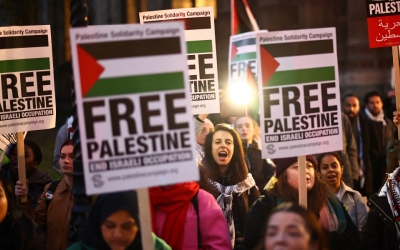
The captives’ families and other commentators therefore believe Netanyahu is in no hurry to pause the fighting to free those held in Gaza.
In fact, he is barely speaking to the captives’ families. It took him two months to meet some of their representatives, leaving them feeling abandoned.
It’s a delicate situation. The mainstream media has adopted the army’s version: military pressure on Hamas will force it to concede a better deal for the captives.
But there’s no sign that this is actually the case. The deal Hamas is offering today appears no different to the one before Israel began its ground invasion on 30 October. In fact, we had four captives released before ground operations even began. None have since been freed.
In a month or two we will probably know the outcome: either the captives will be free or they will be dead.
If the latter comes to pass, the impact on Israel’s social cohesion will be massive. If Israel fails to save dozens of citizens when it had the chance, the social contract between the public, the state and the military will be broken even further.
It would be a trauma that would be very hard to recover from. Can liberal Israel and religious-right Israel continue to live alongside each other?
Netanyahu, for all his cynicism, is aware of this junction that Israel finds itself at - not just for the war itself, but for Israeli society at large.
This article is available in French on Middle East Eye French edition.
Middle East Eye delivers independent and unrivalled coverage and analysis of the Middle East, North Africa and beyond. To learn more about republishing this content and the associated fees, please fill out this form. More about MEE can be found here.


